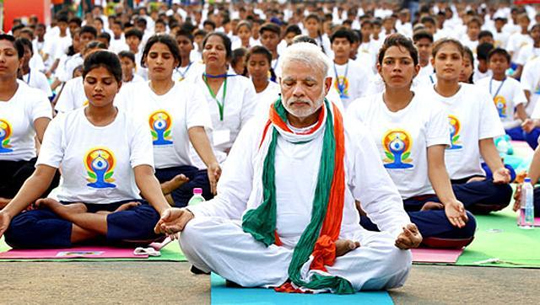Chandigarh, Jun 21: As thousands of people across the country marked the second International Yoga Day on Tuesday, Prime Minister Narendra Modi led the celebrations with 30,000 yoga enthusiasts at Capitol Complex here.

While kicking off the celebrations, the Prime Minister urged the people to embrace yoga for better physical and mental health.
Addressing the huge gathering, PM Modi thanked the international community to recognise the importance of yoga. He said, “The world supported the idea of International Day of Yoga. All sections of society came together in this endeavour.”
While encouraging the people across the country to embrace yoga, the Prime Minister said, “This is a day linked with good health and now it has become a people's mass movement.”
“Yoga is not about what one will get, it is about what one can give up,” he added.
PM @narendramodi at the Capitol Complex, Chandigarh, on the occasion of 2nd #IYD2016 #YogaDay pic.twitter.com/0BCrWnIdQS
— PIB India (@PIB_India) June 21, 2016
Trying to strike a chord with the masses, the PM on a lighter note said, “With zero budget, yoga provides health assurance and it does not discriminate between rich and poor.”
“Important to integrate yoga with our lives. Do not wait, make yoga a part of one's life,” he further said.
Appealing to the masses to make the yoga more popular across the world, the PM said, “Let's make Yoga more popular globally. Let India produce good yoga teachers.”
While acknowledging that diabetes has become a major problems in the country, PM Modi said, “Let's focus on one thing in the coming days, how to mitigate diabetes through yoga,” adding that diabetes can surely be controlled through it.
Over 96,000 people had registered themselves to take part in the event. Of this, over 30,000 were picked, including 10,000 each from Chandigarh, Punjab and Haryana.
Unprecedented security was in place around the venue in Chandigarh's high-security area of Sector 1. The area was sealed off by paramilitary commandos and security agencies ahead of the event.
Yoga guru Ramdev held his record-breaking yoga event in Faridabad town in Haryana, adjoining the national capital, early today.
Organisers said over 100,000 people performed yoga with Ramdev, setting a world record.





Comments
When we study deep in mantras and tantras ... it will lead to occult worship rituals..
Worship the CREATOR not his creation
Dear Modi
Yoga unites everyone and what about RSS. it divides everyone.
Feku! Election gimmick!
Add new comment